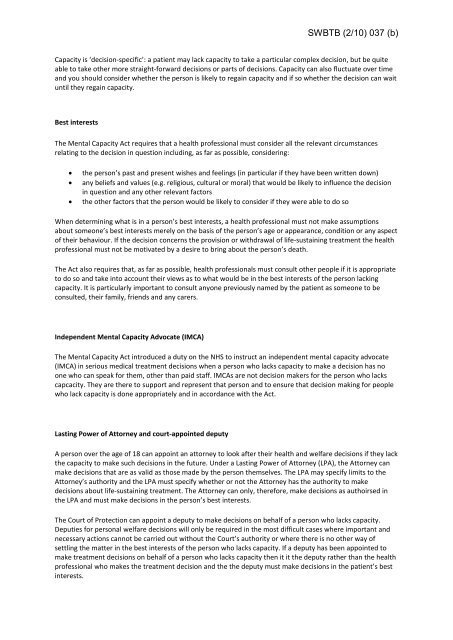Trust Board Febuary 2010 - Sandwell & West Birmingham Hospitals
Trust Board Febuary 2010 - Sandwell & West Birmingham Hospitals
Trust Board Febuary 2010 - Sandwell & West Birmingham Hospitals
You also want an ePaper? Increase the reach of your titles
YUMPU automatically turns print PDFs into web optimized ePapers that Google loves.
SWBTB (2/10) 037 (b)<br />
Capacity is ‘decision-specific’: a patient may lack capacity to take a particular complex decision, but be quite<br />
able to take other more straight-forward decisions or parts of decisions. Capacity can also fluctuate over time<br />
and you should consider whether the person is likely to regain capacity and if so whether the decision can wait<br />
until they regain capacity.<br />
Best interests<br />
The Mental Capacity Act requires that a health professional must consider all the relevant circumstances<br />
relating to the decision in question including, as far as possible, considering:<br />
• the person’s past and present wishes and feelings (in particular if they have been written down)<br />
• any beliefs and values (e.g. religious, cultural or moral) that would be likely to influence the decision<br />
in question and any other relevant factors<br />
• the other factors that the person would be likely to consider if they were able to do so<br />
When determining what is in a person’s best interests, a health professional must not make assumptions<br />
about someone’s best interests merely on the basis of the person’s age or appearance, condition or any aspect<br />
of their behaviour. If the decision concerns the provision or withdrawal of life-sustaining treatment the health<br />
professional must not be motivated by a desire to bring about the person’s death.<br />
The Act also requires that, as far as possible, health professionals must consult other people if it is appropriate<br />
to do so and take into account their views as to what would be in the best interests of the person lacking<br />
capacity. It is particularly important to consult anyone previously named by the patient as someone to be<br />
consulted, their family, friends and any carers.<br />
Independent Mental Capacity Advocate (IMCA)<br />
The Mental Capacity Act introduced a duty on the NHS to instruct an independent mental capacity advocate<br />
(IMCA) in serious medical treatment decisions when a person who lacks capacity to make a decision has no<br />
one who can speak for them, other than paid staff. IMCAs are not decision makers for the person who lacks<br />
capcacity. They are there to support and represent that person and to ensure that decision making for people<br />
who lack capacity is done appropriately and in accordance with the Act.<br />
Lasting Power of Attorney and court-appointed deputy<br />
A person over the age of 18 can appoint an attorney to look after their health and welfare decisions if they lack<br />
the capacity to make such decisions in the future. Under a Lasting Power of Attorney (LPA), the Attorney can<br />
make decisions that are as valid as those made by the person themselves. The LPA may specify limits to the<br />
Attorney’s authority and the LPA must specify whether or not the Attorney has the authority to make<br />
decisions about life-sustaining treatment. The Attorney can only, therefore, make decisions as authoirsed in<br />
the LPA and must make decisions in the person’s best interests.<br />
The Court of Protection can appoint a deputy to make decisions on behalf of a person who lacks capacity.<br />
Deputies for personal welfare decisions will only be required in the most difficult cases where important and<br />
necessary actions cannot be carried out without the Court’s authority or where there is no other way of<br />
settling the matter in the best interests of the person who lacks capacity. If a deputy has been appointed to<br />
make treatment decisions on behalf of a person who lacks capacity then it it the deputy rather than the health<br />
professional who makes the treatment decision and the the deputy must make decisions in the patient’s best<br />
interests.

















